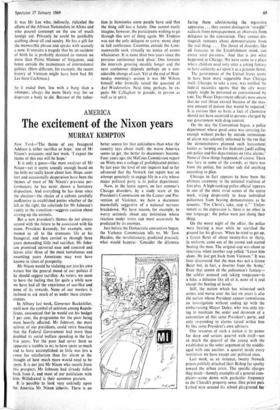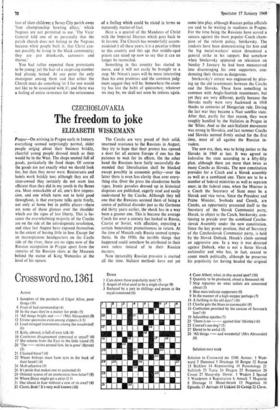The excitement of the Nixon years
AMERICA
mURRAY KEMPTON New York—`The theme of any Inaugural Address is either sacrifice or hope,' one of Mr Nixon's assistants said last week. 'I expect the theme of this one will be hope.'
It is only a guess—like most analyses of Mr Nixon—yet it seems soundly enough based on the little we'really know about him. Hope, cont.
fort and occasionally desperation have been the themes of most of Mr Nixon's previous per- formances; he has never shown a hortatory disposition. And everything he has done since the election—the choice of a cabinet carefully inoffensive to established pieties whether of the left or the right, the solicitude for Mr Johnson's vanity in the transition—suggests caution about stirring up the animals.
But a new president's themes do not always accord with the future to be associated with his name. President Kennedy, for example, sum- moned us all to the strenuous life at his Inaugural, and then carried us through three years demanding little real sacrifice; Mr John- son promised universal ease and concord and leaves after three of the most tumultuous and unsettling years Americans may ever have known in timeS of prosperity.
Mr Nixon would be violating not just his own nature but the general mood of our politics if he should suggest sacrifice. As voters, we seem to have the feeling that for quite a while now we have had all the experience of sacrifice ant_ none of its rewards. None of our masters is inclined to ask much of us under these circum- stances.
In Albany last week, Governor Rockefeller, until now the symbol of activism among Repub- licans, announced that he would cut his budget 5 per cent, the programme for the poor being most heavily affected. Mr Johnson, the most activist of our presidents, could retire boasting that the Federal Government had more than doubled its social welfare spending in the last five years. Yet the poor had never been so apparent a trouble to us; to have spent so much and to have accomplished so little was less a, cause for satisfaction than for alarm at the thought of how much more would need to be spent. It is not just Mr Nixon who recoils from this prospect; Mr Johnson had already fallen back from it, and most of our politicians with him. Withdrawal is their common posture.
It is–possibk to look very unkindly upon the America Mr Nixon inherits. There is no
better source for that unkindness than what the country says about itself; the worse America seems to get, the better its documents become. Four years ago, the McCone Commission report on Watts was a collage of prefabricated pieties; by last year the level of our inquests had so far advanced that the Newark riot report was an attempt genuinely to engage life in a city whose major political party is its police department.
Now, in the latest report, on last summer's Chicago disorders, by a study team of the President's Commission on the Causes and Pre- vention of Violence, we have a document masterfully suggestive of a national nervous breakdown. We have reason, for example, to worry seriously about any institution whose reaction under stress can most accurately be predicted by its enemies.
Just before the Democratic convention began, the Violence Commission tells us, Mr Tom Hayden, the revolutionary, predicted precisely what would happen: `Consider the dilemma facing those administering the regressive apparatus ... they cannot distinguish "straight" radicals from newspapermen, or observers from delegates to the convention. They cannot dis- tinguish rumours about demonstrations from the real thing. . . . The threat of disorder, like all fantasies in the Establishment mind, can create total paranoia.' And that is just what happened in Chicago. We have come to a place where children need only utter a joking fantasy to have authority act upon it as a genuine threat. The government of the United States seems to have been more suggestible than Chicago itself. Chicago, to take a case, was notified 'by federal narcotics agents that the city water supply might be poisoned or contaminated by
LSD. The Water Department officials were aware
that ..no real threat existed because of the mas- sive amount of poison that would be required.'
It is curious that so basic a fact of chemistry should not have occurred to persons charged by our government with drug control.
On the day the Convention began, a police department whose good sense was tottering far
enough without pushes by outside intimations of alarm was solemnly informed by the FBI that the demonstrators planned such harassment tactics as 'turning on fire hydrants [and] calling out police and fire departments on false alarms.' None of these things happened, of course. There was fury in some of the crowds, as there was from the police; but neither side did anything according to plan.
Chicago in fact appears to have been the ultimate ceremony in the national tradition of free play. A high-ranking police official 'appears in one of the most vivid scenes of the entire week, trying desperately to keep individual policemen from beating demonstrators as he screams, "For Christ's sake, stop it."' Unfor- tunate as the expression is, there is no other in our language: the police were just doing their thing.
On the worst night of the affair, the police were beating a man while he searched the ground for his glasses. 'When he tried to get up, a Green Beret of about twenty-five or thirty, in uniform, came out of the crowd and started beating the man. The original cop was about to intervene when another cop yelled, "Leave him alone. He just got back from Vietnam." It was later discovered that the man was not a Green . Beret but, in fact, a deserter from the Army.' Even that crown of the policeman's fantasy— the soldier aroused and taking vengeance—is a fake, a delusion like all of it, none of it real except the beating of heads.
Still, the nation which has witnessed such scenes and worse over the last six years is also the nation whose President cannot commission an investigation without ending up with the embarrassing Mayor Daley, who was only try- ing to maintain the order and decorum of a convention of this same President's party, and only responding to alarms raised within him by this same President's own advisers.
One resource of such a nation is its power for deep and serious quarrel with itself—not so much the quarrel of the young with the established as the sober argument of the middle- aged with one another, a quarrel inside every institution we have except our political ones.
Last week, as an instance, twenty Newark priests publicly attacked their Bishop for apathy toward the urban crisis. The specific charges they made—homely examples of a general com- plaint—came down with particular frequency to the Church's property sense. One priest puts
b trbed wire around hit school playground for fear of slum children; a Jersey City parish owns 'four championship bowling alleys,' which Negroes are not permitted to use. 'The Vicar General told one of us personally that the parish church does not belong to the Negroes because white people built it; that Christ can- not possibly be living in the black community; they are just drunkards, carousers and thieves.'
You had rather expected these protestants to be young; yet the hair of a surprising number had already turned. At one point the only monsignor among them said that either the Church must do something 'or 1 for one would not like to be associated with it'; and there was a feeling of entire reverence for the seriousness of a feeling which could be stated in terms so maturedly matter-of-fact.
Here is a quarrel of the Mandates of Christ with the Imperial Decrees which goes back to St Jerome. The Church has wonderfully accom- modated it all these years; it is a peculiar tribute to this country and this age that middle-aged priests can stand up now to say that it can no longer be reconciled.
Something in this country has started to move, and it will not easily be brought to a stop. Mr Nixon's years will be more interesting than his own promises and the common judg- ment suggest they will be. Somewhere the coun- try has lost the habit of quiescence; whatever we may be, we shall not soon be tedious again.



































 Previous page
Previous page